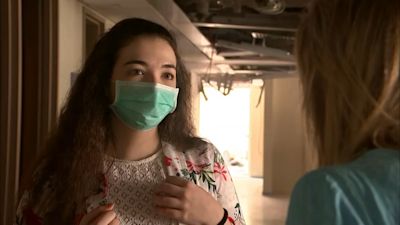'They are under my protection now': The nurse who saved three premature babies during the Beirut blast

Video report by ITV News Correspondent Emma Murphy
In the pitch black and surrounded by crumbling rubble everywhere a nurse courageously managed to rescue three premature babies, amid the devastation in Beirut.
It comes as at least 154 people are now known to have died in the huge blast at the city's port - with many hundreds feared missing.
Pamala Zaynoun, who was knocked out by the blast while working in the maternity unit of one of city's hospitals, described to ITV News of the moment she came round and realised only she could save her tiny patients.
She told ITV News Correspondent Emma Murphy: "The thing that I felt was that these babies belong to me, they are under my protection now, no-one else's protection."
Ms Zaynoun added: "If they are going to make it, they are going to make it with me."
Her story comes as rescue teams continue to search the rubble of Beirut’s port for survivors and the dead nearly three days after a massive explosion ripped through Lebanon’s capital.
The explosion destroyed a large grain silo, devastated neighbourhoods near the port and left swathes of the city littered with glass and rubble.
Security forces in Beirut pushed back protesters with tear gas on Thursday as they tried to storm parliament as fury grows over the massive explosion at the city's port.
Anger is mounting at the government whose negligence, many believe, led to the explosion and are now being left to quite literally clean up the mess.
Lin Sfeir's grandparents house was badly damaged in the explosion and the elderly couple's belongings largely obliterated. Along with other family members, Ms Sfeir is collecting the contents of the house she grew up in into bin bags.
She, along with so many Lebanese, blames the government for the blast.
Ms Sfeir told ITV News: "It's like all our childhood has been destroyed. "It's not even that we don't have hope for the future, they destroyed also our childhood and our memories."
The Lebanese people had received no help from the government, she said, the enormous clean up operation falling the blast had been left to individuals to deal with.
"All the Lebanese are cleaning the streets and renovating everything that has been destroyed. We couldn't find anyone to help us from the government. "All the Lebanese are putting their hands together to us through this mess."
The bride describes the moment the blast hit as she posed for photos on her wedding day
Hezbollah leader Hassan Nasrallah said the explosion revealed nepotism and corruption and that those responsible should be brought to justice.In a speech on Friday, Nasrallah denied his group was responsible for Tuesday's blast or exercised any power at the port. French and Russian rescue teams with dogs were searching the port area on Friday, the day after French President Emmanuel Macron paid a visit to the site, promising aid and vowing to press for reforms by Lebanon’s long-entrenched political leaders.
The blast was apparently caused by the ignition of 2,750 tons of ammonium nitrate, a chemical used for explosives and fertiliser, that had been stored at the port since it was confiscated from an impounded cargo ship in 2013.
Search and rescue teams have been sent from several countries to help locate survivors of the blast.
Among those located in the rubble near the grain silo was Joe Akiki, a 23-year-old port worker who had been missing since the explosion.
Some 300,000 people, more than 12% of Beirut’s population, can not return to their homes after they were left uninhabitable by the explosion.
Officials have estimated losses at US$10 billion to US$15 billion.
Damaged hospitals, already strained by the coronavirus pandemic, have struggled with the influx of wounded.
The government has launched an investigation as it comes under mounting criticism from many Lebanese who are blaming the catastrophe on negligence and corruption.
Although 16 people from the port are under house arrest, there is a growing belief among the Lebanese that the people responsible will not be brought to justice.
For decades, Lebanon has been dominated by the same political elites, many of them former warlords and militia commanders from the 1975-1990 civil war.
The ruling factions use public institutions to accumulate wealth and distribute patronage to supporters.
Thirty years after the end of the civil war, power outages are still frequent, rubbish often goes uncollected and tap water is largely undrinkable.
Even before the blast, the country was mired in a severe economic crisis that was also widely blamed on the political class.
Unemployment was soaring, and a collapse of the local currency wiped out many people’s savings.
That will make the task of rebuilding after the blast even more daunting.